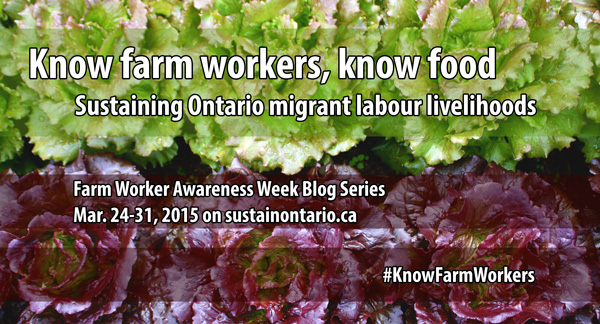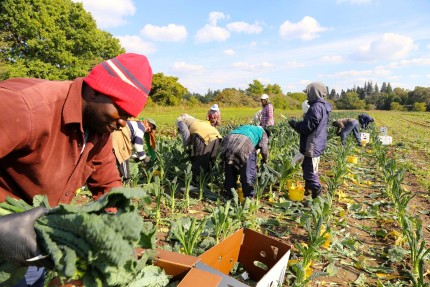Cultivating equitable ground in a food system that sows dissension: Farm employer and industry perspectives
Posted: March 27, 2015
Categories: News from Sustain Members / Research

As part of Farmworker Awareness Week (March 24-31st, 2015), this blog series highlights some of the ideas we have gathered over the past several months on promoting healthier, more sustainable farm worker livelihoods. Check out the bottom of this post for background detail on this community research partnership between Sustain Ontario and the University of Toronto.
Moving beyond “finger-pointing and divisiveness”
“Farmers are trying to make a living. So are farm workers. You know, we’re all in it together. And our food system has pitted us against each other.”
Jenn Pfenning knows firsthand the pressures that shape farmers’ employment practices. Seemingly distant dynamics of global economic competition can squeeze local Ontario farms like Pfenning’s Organic Farm, which employs up to 126 people seasonally and 60 people year round, including about 22 returning migrant farm workers from Jamaica. Pfenning asserts that agribusiness monopoly structures and under-valuing of food have aggravated the ‘cost-price squeeze’ affecting farmers: “We are responsible for price-setting and selling. As we are pressured to drop our prices, find efficiencies, and reduce costs, when you look at your business and the biggest single cost is labour, it’s very difficult. And politically and societally, we’ve been on a cheap food policy for a long time.” Both farmers and farm workers are impacted – albeit in different ways – by an economic and political context that encourages lopsided ownership of productive resources in the food system, heightened competition, and a focus on profit above all else.
People often see the resulting friction between farmers and hired farm workers as natural – ‘that’s just the way it is.’ Pfenning, however, is pushing for conversations and concrete changes that move away from what she calls “finger-pointing and divisiveness” and toward equitability and economic viability for both farmers and farm workers. This has meant establishing a culture of inclusivity in the farm’s labour teams and valuing each person’s ideas, contributions and skills. Pfenning’s Organic is also exploring the option of formalizing a pay equity policy within its company by-laws that would tie the company’s top wages to its bottom wages.
Agricultural exceptionalism
Even though individual farms like Pfenning’s Organic are working to build a culture of inclusivity and fairness for all members of their farm, the broader legal framework of farm employment remains a concern for farm worker advocates. For example, farm workers are excluded from the legal minimum standards in the Ontario Employment Standards Act that govern maximum hours of work, overtime pay, periods of rest, eating periods, vacation, and public holidays (unlike Canadian farm workers in Ontario, migrant farm workers are entitled to at least the minimum wage). Likewise, farm workers are exempt from legislation related to collective bargaining and union certification, which means in effect that they cannot unionize in Ontario.
Another layer of challenges to farm worker equitability exists at the federal level. Farm workers hired through Canada’s temporary farm worker program pay income taxes, EI and CPP, but their access to these benefits is limited. In 2012, the federal government revoked migrant farm workers’ access to special EI parental, maternal and compassionate benefits. Because they work in Canada for only part of the year, migrant farm workers often can’t log enough hours to qualify for a pension. Further, the Seasonal Agricultural Worker Program (SAWP) doesn’t provide the option of permanent residency or citizenship, even for SAWP workers who have contributed to Canada’s rural communities each season for thirty consecutive years. The lack of citizenship and its associated bundle of rights means it is difficult for migrant farm workers to voice their perspectives because they can be repatriated at any point. Consequently, the food movement in Canada misses out on learning from migrant farm workers’ rich sets of knowledge and hearing their views on how to build a better food system.
The unusual legal rules applying to farm workers are often justified on the basis that farming is special. The idea of ‘agricultural exceptionalism’ suggests that because agriculture meets humanity’s fundamental need for food, and because farmers are subject to market fluctuations and weather they can’t control, agriculture is an exceptional industry deserving of special policy support to ensure its profitability. “There are very good reasons for those exemptions, and we continue to defend them,” says a representative from a provincial farm organization who asked to remain unnamed. He explains, “People don’t understand. It’s so different working with living organisms [crops and farm animals]. A traditional view of work may not necessarily apply.”
Some farmers, however, disagree that the unique importance of agriculture should necessarily justify the status quo for farm workers. Pfenning feels strongly that Ontarians who care about agriculture should work toward equitability for all people who produce food. In addition to farming, Pfenning is the President of both the Organic Council of Ontario and the Waterloo-Wellington National Farmers Union. She also serves as a board member on the Waterloo Region Food System Roundtable.
Among numerous policy changes she would personally like to see, Pfenning advocates that migrant farm workers who sustain occupational injuries or illness in Ontario and are unable to work should be able to access full medical treatment instead of being automatically repatriated to their sending countries. All migrant farm workers are supposed to be covered by provincial health care, but if a worker were repatriated to Jamaica, for instance, they would no longer have free medical care. Pfenning says this looming possibility of repatriation creates a “culture of fear” such that many migrants are too afraid to report illness or injury. Further, she recommends, “I think Sustain should champion a path to citizenship, or at least landed immigrant status for temporary foreign workers of all kinds. Particularly, that is a gap in the SAWP; there is no path to residency or citizenship, and there should be.”
Redistributing the benefits of Canada’s temporary farm worker program
So should Canada’s temporary farm worker program be scrapped? Farm workers, farmers and farm industry organizations alike generally say “no.” From the perspective of the farm industry representative we spoke to, “The SAWP works well for what it does. It addresses a huge labour deficit. Very rarely does a labour market assessment turn out negative. Farmers are desperate for workers, I’m sure every farmer in Ontario would say they wish they could hire local workers.” While some argue that better wages and working conditions for farm workers would help to attract local workers, this returns to the aforementioned dilemma of the cost-price squeeze facing farm employers.

Jenn, Ekk and Barnhild Pfenning visiting Desmond, a long-time employee with Pfenning’s Organic Farm, and his family in Jamaica in 2012. Photo: Pfenning’s Organic Farm.
Like the forces of globalization that squeeze farmers, trade liberalization and other processes of globalization have eroded traditional farm livelihoods in migrant farm worker sending countries like Mexico, prompting many migrants to seek employment abroad. Pfenning argues that the program also “offers very substantial benefits to the participating country.” She says that because of high unemployment in Jamaica, in the absence of the SAWP many of her Jamaican farm team members would not be able to cover the cost of school fees for their children, some of whom she has had the chance to meet while visiting long-time employees in Jamaica.
Given the multiple layers of pressure facing both farmers and migrant farm workers in Ontario, it is no surprise that conversations on the topic of farm worker equitability are often fraught. However, based on our interviews, we have learned there is a strong appetite among many parties for collaboratively working toward a food system that distributes the risks, benefits, challenges and joys of farm work in a way that better meets everyone’s needs.
6 Key ideas from farmers and farm industry for Ontario’s food movement to advance migrant farm worker health equity, safety and dignity
- 1. Repatriation: Ending the automatic repatriation of workers who report abuse or need medical treatment for injuries or illness sustained while working in Canada.
- 2. Orientation: When workers arrive in Canada, the Canada Border Services Agency should inform each worker about their rights and what to do if something goes wrong, with information and relevant hotline numbers summarized in a simple handout that is kept separate from a worker’s passport and visa.
- 3. Mobility: Pfenning argues that migrant farm workers should be able to freely choose the farms where they want to work and switch farms more easily when they encounter problems.
- 4. Citizenship: Pfenning also proposes that migrant farm workers should have access to citizenship in Canada.
- 5. Better protections for workers in non-SAWP streams: Migrant farm workers hired under streams of the Temporary Foreign Worker Program other than the SAWP do not have a liaison/Consulate from their country responsible for mediating between workers and employers; this leaves migrants more vulnerable to abuse.
- 6. Skill building for employers: From the experience of the provincial farm industry representative, “One of the challenges, specifically, for farm employers, is that a lot of employers likely had no intention (or training, or skills) to become a boss.” He argues, “The best thing for employees is clear regulations for employers.” To this end, organizations like Sustain Ontario could host workshops for farm employers around true cost accounting, human resource management, and navigating regulations around health, safety and labour.
Sustain Ontario’s mission is to support food systems in Ontario that are “healthy, equitable, ecological and financially viable through collaborative action.” We recognize, however, that important gaps exist in improving equitability and financial viability for both farmers and hired farm workers, particularly for migrant farm workers. To that end, over the past several months Sustain Ontario has partnered with University of Toronto sociology doctoral student Anelyse Weiler on a service-learning project related to her research on migration, farm labour and food sovereignty. In light of the complexity of this issue, our aim is to highlight a range of perspectives in order to point toward possible actionable solutions that better meet the needs of all eaters, farmers and farm workers.
We invite all readers to participate in this ongoing conversation by commenting on the blog post series, on Sustain Ontario’s Facebook page, tweeting @SustainOntario, or emailing anelyse.weiler@mail.utoronto.ca. Feel free to use the hashtag #KnowFarmWorkers. How should Sustain Ontario take action on this issue? Please share your thoughts in the following short survey.
Create your free online surveys with SurveyMonkey , the world’s leading questionnaire tool.
3 responses to “Cultivating equitable ground in a food system that sows dissension: Farm employer and industry perspectives”
Leave a Reply
You must be logged in to post a comment.



[…] of Pfenning’s Organic Farm, would like to see similar immigration policy changes (check out this post for our interview with Pfenning). Although citizenship generally falls under federal […]
[…] farm worker employment is a contentious topic. Our goal in the blog series was, in the words of one farmer we interviewed, to move the conversation beyond “finger pointing and divisiveness,” and to rethink systems of […]
“Farmers are trying to make a living. So are farm workers. You know, we’re all in it together. And our food system has pitted us against each other.”
Come in, it’s not the “food system” to blame for this, it’s the capitalist system. I don’t see the Pfenning’s, literally a bunch of white land owners, giving up their class and race privilege and turning the farm in to a cooperative, owned by the workers themselves. Yeah right. Of course they love SAWP, it preserves the status quo of rich white land owners and black and brown field hands. How do you not see this? Sure it helps them “stay in business”, so that they can exploit someone else’s labour for a profit, instead of having to sell their own labour to survive, like the other 99% of humanity under capitalism. The whole thing is absolutely ridiculous, right down to classic racism of the “benevolent white”, and the “simple-minded” black field hand who supposedly has no other ambition on life other than slaving away for some rich white family. I just can’t believe how steeped in this sort of thinking you guys must be that you can’t see this reality. These places are 21st century plantations, not an example we should follow. Absolutely clueless white academics. Familias Unidas has the right idea, not you guys.